Impact of Leadership and Management on Hazev Restaurant Success Report
VerifiedAdded on 2020/12/31
|7
|1831
|290
Report
AI Summary
This report provides a comprehensive analysis of leadership and management within the service industry, using Hazev, a London-based restaurant, as a case study. The report begins by exploring classical management theories, such as Frederick Taylor's Scientific Management and Henri Fayol's Administrative Management Principles, and their practical application within Hazev's operations. It then delves into the roles of leaders, various leadership styles (autocratic, democratic, and participative), and the specific leadership approaches employed at Hazev. The report also examines the influence of both internal factors (organizational culture, employee diversity) and external factors (political factors, digital technology) on management styles and structures. Furthermore, the report highlights the impact of digital technology on management and leadership practices, emphasizing its role in enhancing flexibility and communication. In conclusion, the report underscores the significance of leadership styles and skills in driving organizational success within the service sector, emphasizing the importance of adapting to internal and external influences to foster effective management and employee engagement.
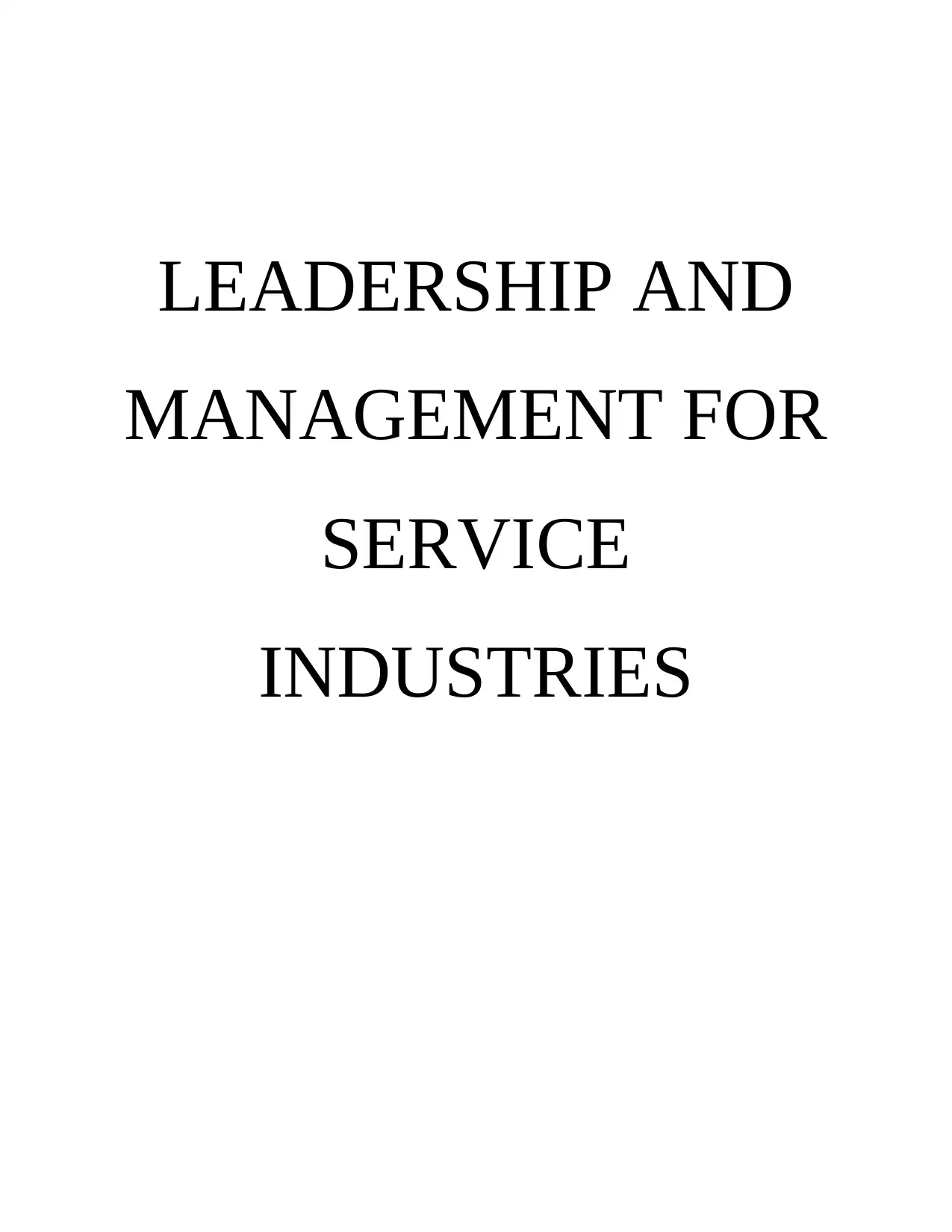
LEADERSHIP AND
MANAGEMENT FOR
SERVICE
INDUSTRIES
MANAGEMENT FOR
SERVICE
INDUSTRIES
Paraphrase This Document
Need a fresh take? Get an instant paraphrase of this document with our AI Paraphraser
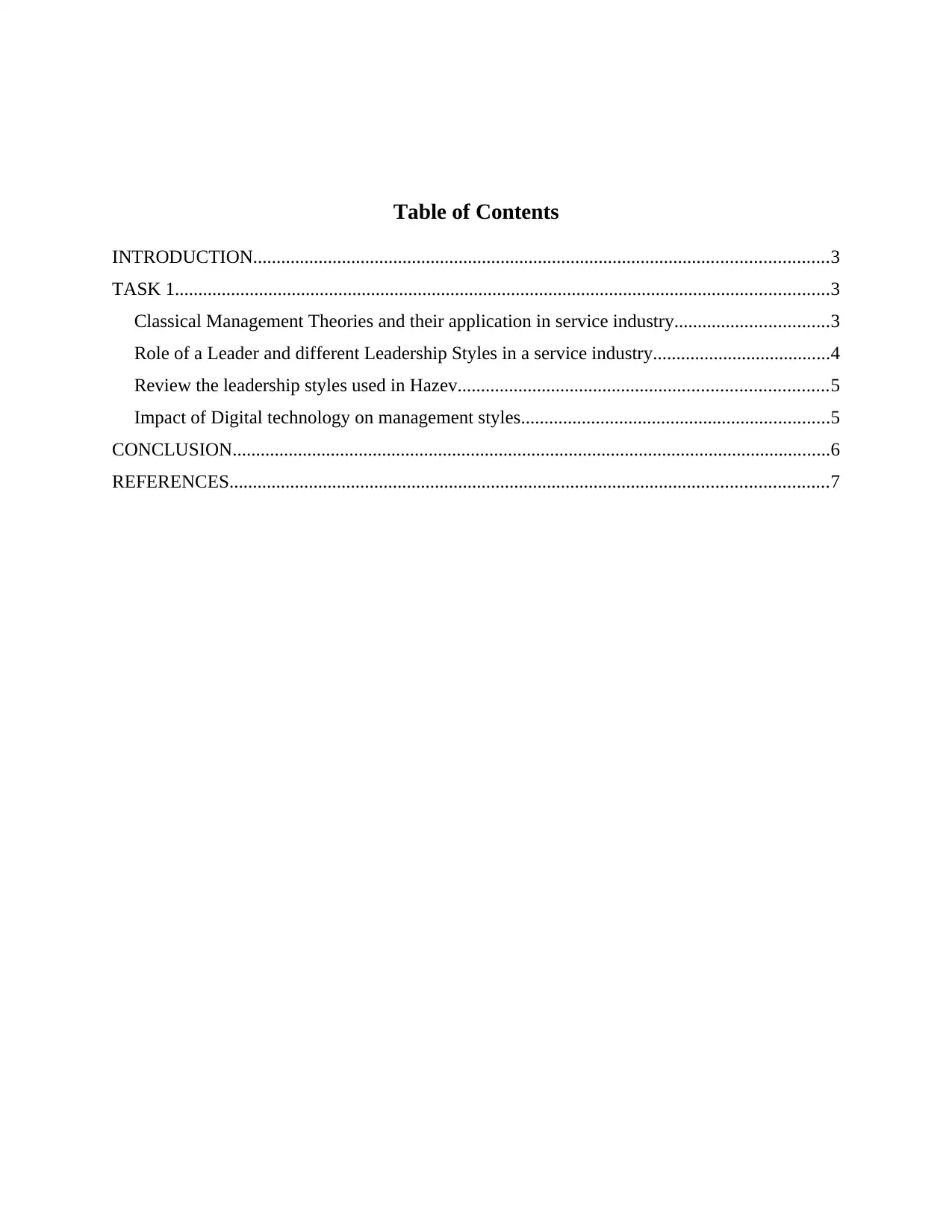
Table of Contents
INTRODUCTION...........................................................................................................................3
TASK 1............................................................................................................................................3
Classical Management Theories and their application in service industry.................................3
Role of a Leader and different Leadership Styles in a service industry......................................4
Review the leadership styles used in Hazev...............................................................................5
Impact of Digital technology on management styles..................................................................5
CONCLUSION................................................................................................................................6
REFERENCES................................................................................................................................7
INTRODUCTION...........................................................................................................................3
TASK 1............................................................................................................................................3
Classical Management Theories and their application in service industry.................................3
Role of a Leader and different Leadership Styles in a service industry......................................4
Review the leadership styles used in Hazev...............................................................................5
Impact of Digital technology on management styles..................................................................5
CONCLUSION................................................................................................................................6
REFERENCES................................................................................................................................7
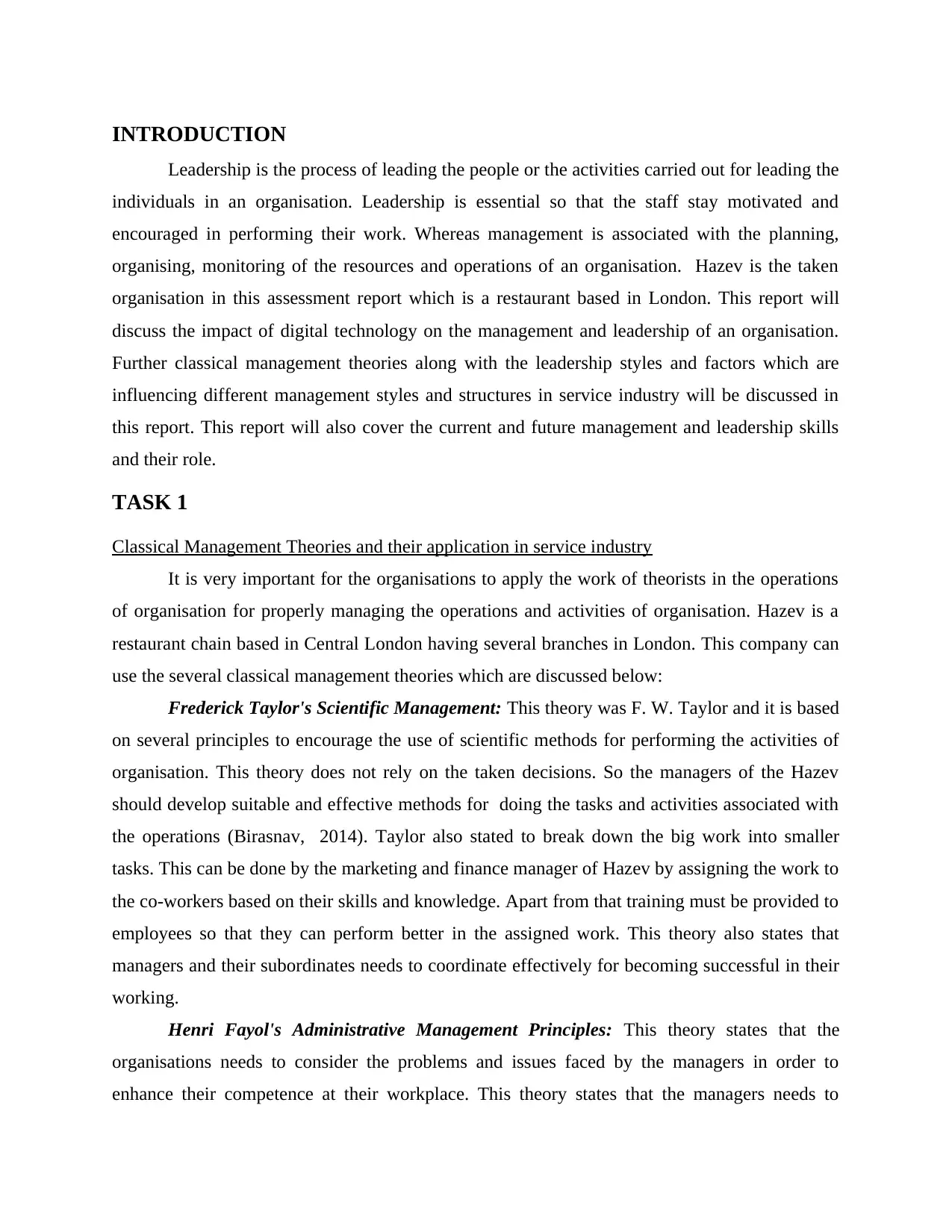
INTRODUCTION
Leadership is the process of leading the people or the activities carried out for leading the
individuals in an organisation. Leadership is essential so that the staff stay motivated and
encouraged in performing their work. Whereas management is associated with the planning,
organising, monitoring of the resources and operations of an organisation. Hazev is the taken
organisation in this assessment report which is a restaurant based in London. This report will
discuss the impact of digital technology on the management and leadership of an organisation.
Further classical management theories along with the leadership styles and factors which are
influencing different management styles and structures in service industry will be discussed in
this report. This report will also cover the current and future management and leadership skills
and their role.
TASK 1
Classical Management Theories and their application in service industry
It is very important for the organisations to apply the work of theorists in the operations
of organisation for properly managing the operations and activities of organisation. Hazev is a
restaurant chain based in Central London having several branches in London. This company can
use the several classical management theories which are discussed below:
Frederick Taylor's Scientific Management: This theory was F. W. Taylor and it is based
on several principles to encourage the use of scientific methods for performing the activities of
organisation. This theory does not rely on the taken decisions. So the managers of the Hazev
should develop suitable and effective methods for doing the tasks and activities associated with
the operations (Birasnav, 2014). Taylor also stated to break down the big work into smaller
tasks. This can be done by the marketing and finance manager of Hazev by assigning the work to
the co-workers based on their skills and knowledge. Apart from that training must be provided to
employees so that they can perform better in the assigned work. This theory also states that
managers and their subordinates needs to coordinate effectively for becoming successful in their
working.
Henri Fayol's Administrative Management Principles: This theory states that the
organisations needs to consider the problems and issues faced by the managers in order to
enhance their competence at their workplace. This theory states that the managers needs to
Leadership is the process of leading the people or the activities carried out for leading the
individuals in an organisation. Leadership is essential so that the staff stay motivated and
encouraged in performing their work. Whereas management is associated with the planning,
organising, monitoring of the resources and operations of an organisation. Hazev is the taken
organisation in this assessment report which is a restaurant based in London. This report will
discuss the impact of digital technology on the management and leadership of an organisation.
Further classical management theories along with the leadership styles and factors which are
influencing different management styles and structures in service industry will be discussed in
this report. This report will also cover the current and future management and leadership skills
and their role.
TASK 1
Classical Management Theories and their application in service industry
It is very important for the organisations to apply the work of theorists in the operations
of organisation for properly managing the operations and activities of organisation. Hazev is a
restaurant chain based in Central London having several branches in London. This company can
use the several classical management theories which are discussed below:
Frederick Taylor's Scientific Management: This theory was F. W. Taylor and it is based
on several principles to encourage the use of scientific methods for performing the activities of
organisation. This theory does not rely on the taken decisions. So the managers of the Hazev
should develop suitable and effective methods for doing the tasks and activities associated with
the operations (Birasnav, 2014). Taylor also stated to break down the big work into smaller
tasks. This can be done by the marketing and finance manager of Hazev by assigning the work to
the co-workers based on their skills and knowledge. Apart from that training must be provided to
employees so that they can perform better in the assigned work. This theory also states that
managers and their subordinates needs to coordinate effectively for becoming successful in their
working.
Henri Fayol's Administrative Management Principles: This theory states that the
organisations needs to consider the problems and issues faced by the managers in order to
enhance their competence at their workplace. This theory states that the managers needs to
⊘ This is a preview!⊘
Do you want full access?
Subscribe today to unlock all pages.

Trusted by 1+ million students worldwide
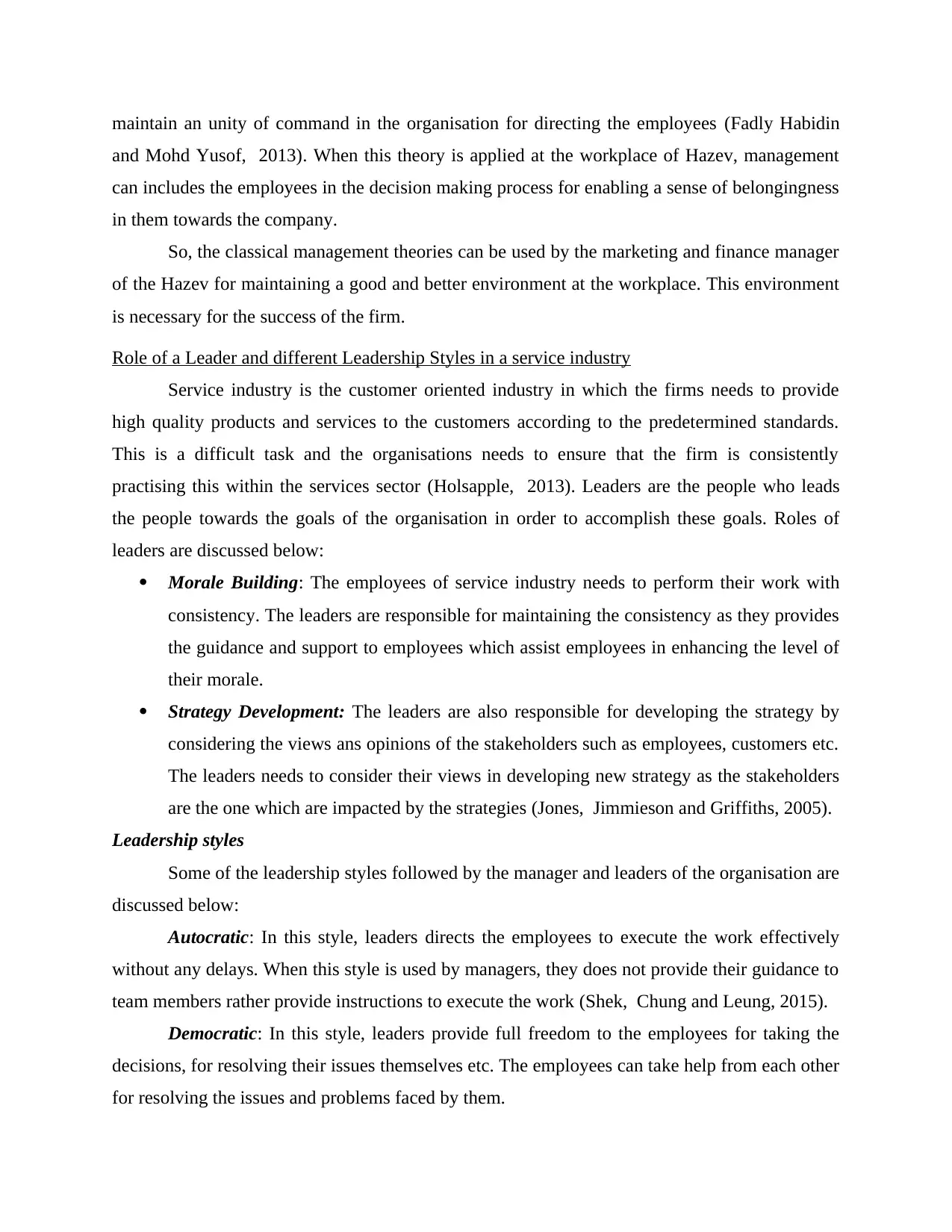
maintain an unity of command in the organisation for directing the employees (Fadly Habidin
and Mohd Yusof, 2013). When this theory is applied at the workplace of Hazev, management
can includes the employees in the decision making process for enabling a sense of belongingness
in them towards the company.
So, the classical management theories can be used by the marketing and finance manager
of the Hazev for maintaining a good and better environment at the workplace. This environment
is necessary for the success of the firm.
Role of a Leader and different Leadership Styles in a service industry
Service industry is the customer oriented industry in which the firms needs to provide
high quality products and services to the customers according to the predetermined standards.
This is a difficult task and the organisations needs to ensure that the firm is consistently
practising this within the services sector (Holsapple, 2013). Leaders are the people who leads
the people towards the goals of the organisation in order to accomplish these goals. Roles of
leaders are discussed below:
Morale Building: The employees of service industry needs to perform their work with
consistency. The leaders are responsible for maintaining the consistency as they provides
the guidance and support to employees which assist employees in enhancing the level of
their morale.
Strategy Development: The leaders are also responsible for developing the strategy by
considering the views ans opinions of the stakeholders such as employees, customers etc.
The leaders needs to consider their views in developing new strategy as the stakeholders
are the one which are impacted by the strategies (Jones, Jimmieson and Griffiths, 2005).
Leadership styles
Some of the leadership styles followed by the manager and leaders of the organisation are
discussed below:
Autocratic: In this style, leaders directs the employees to execute the work effectively
without any delays. When this style is used by managers, they does not provide their guidance to
team members rather provide instructions to execute the work (Shek, Chung and Leung, 2015).
Democratic: In this style, leaders provide full freedom to the employees for taking the
decisions, for resolving their issues themselves etc. The employees can take help from each other
for resolving the issues and problems faced by them.
and Mohd Yusof, 2013). When this theory is applied at the workplace of Hazev, management
can includes the employees in the decision making process for enabling a sense of belongingness
in them towards the company.
So, the classical management theories can be used by the marketing and finance manager
of the Hazev for maintaining a good and better environment at the workplace. This environment
is necessary for the success of the firm.
Role of a Leader and different Leadership Styles in a service industry
Service industry is the customer oriented industry in which the firms needs to provide
high quality products and services to the customers according to the predetermined standards.
This is a difficult task and the organisations needs to ensure that the firm is consistently
practising this within the services sector (Holsapple, 2013). Leaders are the people who leads
the people towards the goals of the organisation in order to accomplish these goals. Roles of
leaders are discussed below:
Morale Building: The employees of service industry needs to perform their work with
consistency. The leaders are responsible for maintaining the consistency as they provides
the guidance and support to employees which assist employees in enhancing the level of
their morale.
Strategy Development: The leaders are also responsible for developing the strategy by
considering the views ans opinions of the stakeholders such as employees, customers etc.
The leaders needs to consider their views in developing new strategy as the stakeholders
are the one which are impacted by the strategies (Jones, Jimmieson and Griffiths, 2005).
Leadership styles
Some of the leadership styles followed by the manager and leaders of the organisation are
discussed below:
Autocratic: In this style, leaders directs the employees to execute the work effectively
without any delays. When this style is used by managers, they does not provide their guidance to
team members rather provide instructions to execute the work (Shek, Chung and Leung, 2015).
Democratic: In this style, leaders provide full freedom to the employees for taking the
decisions, for resolving their issues themselves etc. The employees can take help from each other
for resolving the issues and problems faced by them.
Paraphrase This Document
Need a fresh take? Get an instant paraphrase of this document with our AI Paraphraser
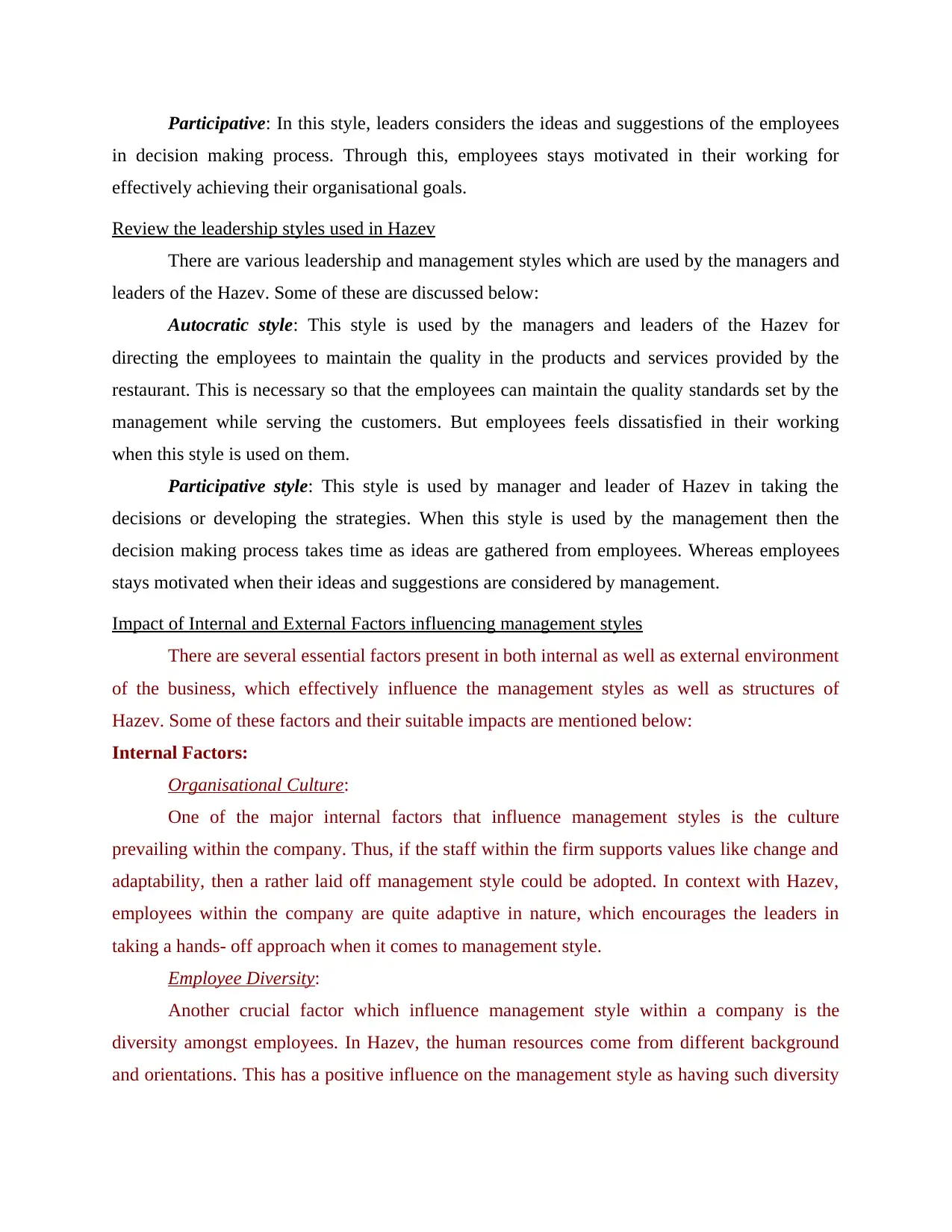
Participative: In this style, leaders considers the ideas and suggestions of the employees
in decision making process. Through this, employees stays motivated in their working for
effectively achieving their organisational goals.
Review the leadership styles used in Hazev
There are various leadership and management styles which are used by the managers and
leaders of the Hazev. Some of these are discussed below:
Autocratic style: This style is used by the managers and leaders of the Hazev for
directing the employees to maintain the quality in the products and services provided by the
restaurant. This is necessary so that the employees can maintain the quality standards set by the
management while serving the customers. But employees feels dissatisfied in their working
when this style is used on them.
Participative style: This style is used by manager and leader of Hazev in taking the
decisions or developing the strategies. When this style is used by the management then the
decision making process takes time as ideas are gathered from employees. Whereas employees
stays motivated when their ideas and suggestions are considered by management.
Impact of Internal and External Factors influencing management styles
There are several essential factors present in both internal as well as external environment
of the business, which effectively influence the management styles as well as structures of
Hazev. Some of these factors and their suitable impacts are mentioned below:
Internal Factors:
Organisational Culture:
One of the major internal factors that influence management styles is the culture
prevailing within the company. Thus, if the staff within the firm supports values like change and
adaptability, then a rather laid off management style could be adopted. In context with Hazev,
employees within the company are quite adaptive in nature, which encourages the leaders in
taking a hands- off approach when it comes to management style.
Employee Diversity:
Another crucial factor which influence management style within a company is the
diversity amongst employees. In Hazev, the human resources come from different background
and orientations. This has a positive influence on the management style as having such diversity
in decision making process. Through this, employees stays motivated in their working for
effectively achieving their organisational goals.
Review the leadership styles used in Hazev
There are various leadership and management styles which are used by the managers and
leaders of the Hazev. Some of these are discussed below:
Autocratic style: This style is used by the managers and leaders of the Hazev for
directing the employees to maintain the quality in the products and services provided by the
restaurant. This is necessary so that the employees can maintain the quality standards set by the
management while serving the customers. But employees feels dissatisfied in their working
when this style is used on them.
Participative style: This style is used by manager and leader of Hazev in taking the
decisions or developing the strategies. When this style is used by the management then the
decision making process takes time as ideas are gathered from employees. Whereas employees
stays motivated when their ideas and suggestions are considered by management.
Impact of Internal and External Factors influencing management styles
There are several essential factors present in both internal as well as external environment
of the business, which effectively influence the management styles as well as structures of
Hazev. Some of these factors and their suitable impacts are mentioned below:
Internal Factors:
Organisational Culture:
One of the major internal factors that influence management styles is the culture
prevailing within the company. Thus, if the staff within the firm supports values like change and
adaptability, then a rather laid off management style could be adopted. In context with Hazev,
employees within the company are quite adaptive in nature, which encourages the leaders in
taking a hands- off approach when it comes to management style.
Employee Diversity:
Another crucial factor which influence management style within a company is the
diversity amongst employees. In Hazev, the human resources come from different background
and orientations. This has a positive influence on the management style as having such diversity
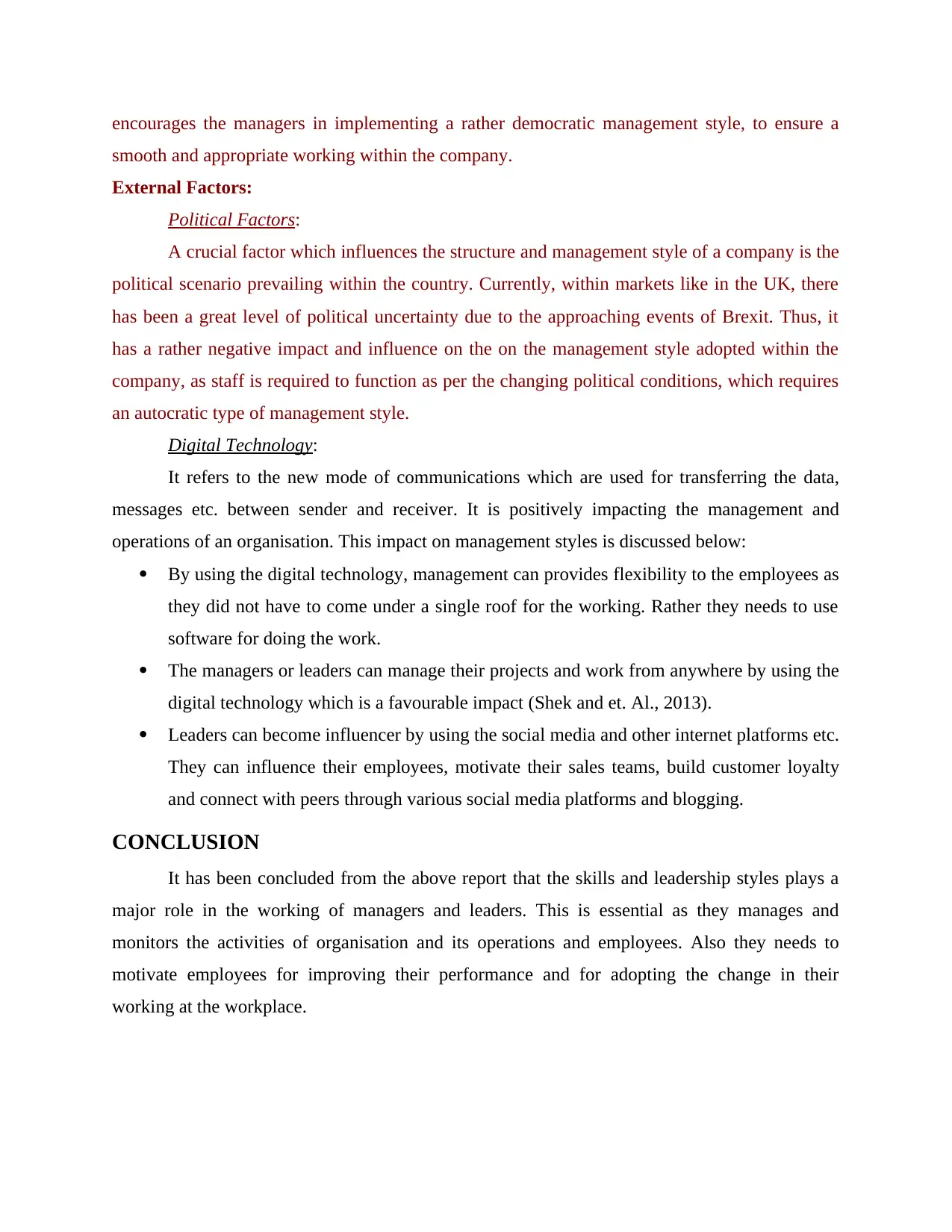
encourages the managers in implementing a rather democratic management style, to ensure a
smooth and appropriate working within the company.
External Factors:
Political Factors:
A crucial factor which influences the structure and management style of a company is the
political scenario prevailing within the country. Currently, within markets like in the UK, there
has been a great level of political uncertainty due to the approaching events of Brexit. Thus, it
has a rather negative impact and influence on the on the management style adopted within the
company, as staff is required to function as per the changing political conditions, which requires
an autocratic type of management style.
Digital Technology:
It refers to the new mode of communications which are used for transferring the data,
messages etc. between sender and receiver. It is positively impacting the management and
operations of an organisation. This impact on management styles is discussed below:
By using the digital technology, management can provides flexibility to the employees as
they did not have to come under a single roof for the working. Rather they needs to use
software for doing the work.
The managers or leaders can manage their projects and work from anywhere by using the
digital technology which is a favourable impact (Shek and et. Al., 2013).
Leaders can become influencer by using the social media and other internet platforms etc.
They can influence their employees, motivate their sales teams, build customer loyalty
and connect with peers through various social media platforms and blogging.
CONCLUSION
It has been concluded from the above report that the skills and leadership styles plays a
major role in the working of managers and leaders. This is essential as they manages and
monitors the activities of organisation and its operations and employees. Also they needs to
motivate employees for improving their performance and for adopting the change in their
working at the workplace.
smooth and appropriate working within the company.
External Factors:
Political Factors:
A crucial factor which influences the structure and management style of a company is the
political scenario prevailing within the country. Currently, within markets like in the UK, there
has been a great level of political uncertainty due to the approaching events of Brexit. Thus, it
has a rather negative impact and influence on the on the management style adopted within the
company, as staff is required to function as per the changing political conditions, which requires
an autocratic type of management style.
Digital Technology:
It refers to the new mode of communications which are used for transferring the data,
messages etc. between sender and receiver. It is positively impacting the management and
operations of an organisation. This impact on management styles is discussed below:
By using the digital technology, management can provides flexibility to the employees as
they did not have to come under a single roof for the working. Rather they needs to use
software for doing the work.
The managers or leaders can manage their projects and work from anywhere by using the
digital technology which is a favourable impact (Shek and et. Al., 2013).
Leaders can become influencer by using the social media and other internet platforms etc.
They can influence their employees, motivate their sales teams, build customer loyalty
and connect with peers through various social media platforms and blogging.
CONCLUSION
It has been concluded from the above report that the skills and leadership styles plays a
major role in the working of managers and leaders. This is essential as they manages and
monitors the activities of organisation and its operations and employees. Also they needs to
motivate employees for improving their performance and for adopting the change in their
working at the workplace.
⊘ This is a preview!⊘
Do you want full access?
Subscribe today to unlock all pages.

Trusted by 1+ million students worldwide
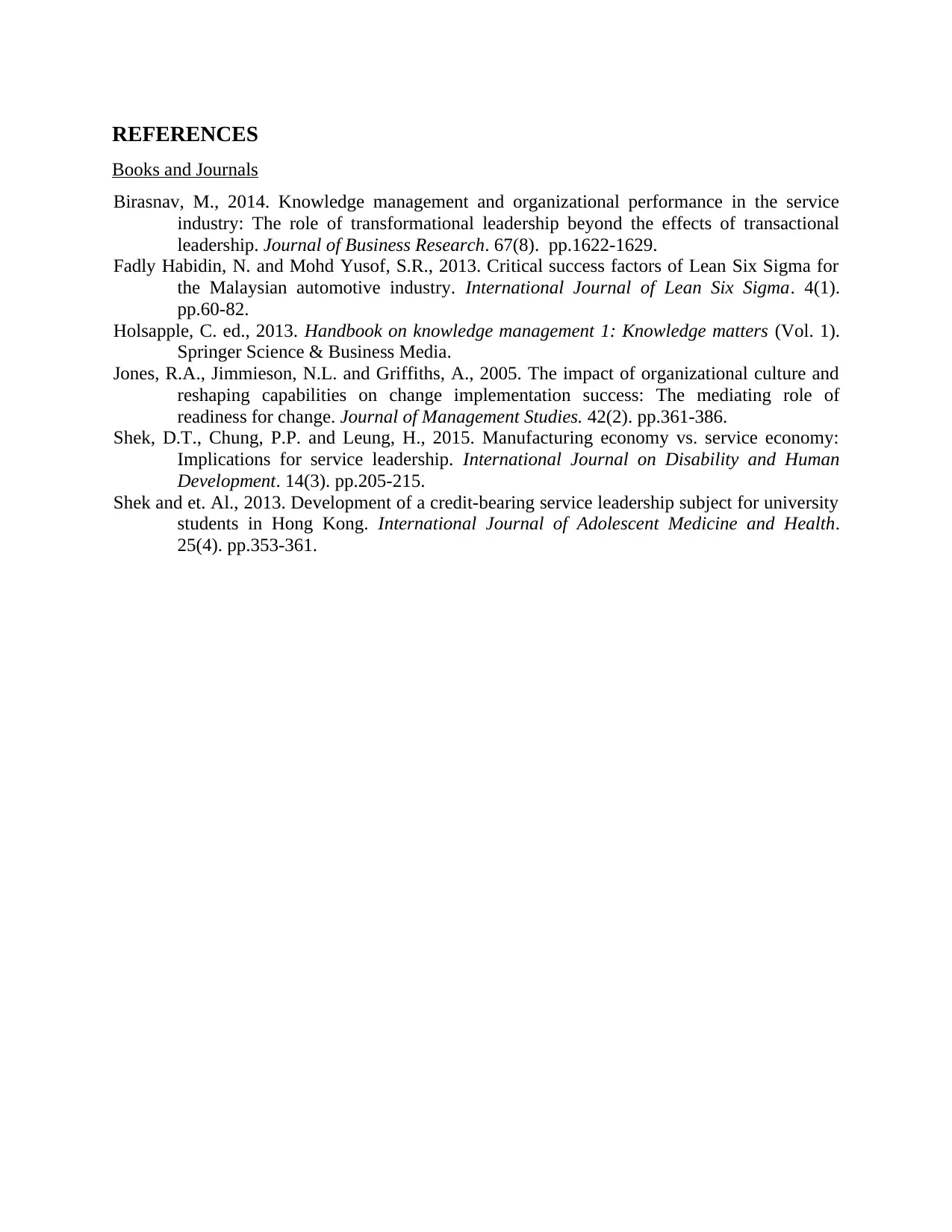
REFERENCES
Books and Journals
Birasnav, M., 2014. Knowledge management and organizational performance in the service
industry: The role of transformational leadership beyond the effects of transactional
leadership. Journal of Business Research. 67(8). pp.1622-1629.
Fadly Habidin, N. and Mohd Yusof, S.R., 2013. Critical success factors of Lean Six Sigma for
the Malaysian automotive industry. International Journal of Lean Six Sigma. 4(1).
pp.60-82.
Holsapple, C. ed., 2013. Handbook on knowledge management 1: Knowledge matters (Vol. 1).
Springer Science & Business Media.
Jones, R.A., Jimmieson, N.L. and Griffiths, A., 2005. The impact of organizational culture and
reshaping capabilities on change implementation success: The mediating role of
readiness for change. Journal of Management Studies. 42(2). pp.361-386.
Shek, D.T., Chung, P.P. and Leung, H., 2015. Manufacturing economy vs. service economy:
Implications for service leadership. International Journal on Disability and Human
Development. 14(3). pp.205-215.
Shek and et. Al., 2013. Development of a credit-bearing service leadership subject for university
students in Hong Kong. International Journal of Adolescent Medicine and Health.
25(4). pp.353-361.
Books and Journals
Birasnav, M., 2014. Knowledge management and organizational performance in the service
industry: The role of transformational leadership beyond the effects of transactional
leadership. Journal of Business Research. 67(8). pp.1622-1629.
Fadly Habidin, N. and Mohd Yusof, S.R., 2013. Critical success factors of Lean Six Sigma for
the Malaysian automotive industry. International Journal of Lean Six Sigma. 4(1).
pp.60-82.
Holsapple, C. ed., 2013. Handbook on knowledge management 1: Knowledge matters (Vol. 1).
Springer Science & Business Media.
Jones, R.A., Jimmieson, N.L. and Griffiths, A., 2005. The impact of organizational culture and
reshaping capabilities on change implementation success: The mediating role of
readiness for change. Journal of Management Studies. 42(2). pp.361-386.
Shek, D.T., Chung, P.P. and Leung, H., 2015. Manufacturing economy vs. service economy:
Implications for service leadership. International Journal on Disability and Human
Development. 14(3). pp.205-215.
Shek and et. Al., 2013. Development of a credit-bearing service leadership subject for university
students in Hong Kong. International Journal of Adolescent Medicine and Health.
25(4). pp.353-361.
1 out of 7
Related Documents
Your All-in-One AI-Powered Toolkit for Academic Success.
+13062052269
info@desklib.com
Available 24*7 on WhatsApp / Email
![[object Object]](/_next/static/media/star-bottom.7253800d.svg)
Unlock your academic potential
Copyright © 2020–2025 A2Z Services. All Rights Reserved. Developed and managed by ZUCOL.





